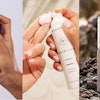Aveda
Vegan hair care for various hair types

Aveda's Sustainability Rating
Fair
Ingredients
Aveda has made ingredient commitments to lower its environmental impact, including by avoiding parabens, phthalates, other petrochemical-based ingredients, and uncertified palm oil. While it has made commitments, it still uses some ingredients that pose a significant threat to the climate, including other petrochemical-based ingredients. Its products incorporate bio-based and/or biodegradable ingredients. It carries products that have certifications from Leaping Bunny, and Aveda is a certified B Corp.
Containers & Packaging
Aveda hasn't made any efforts to concentrate its products or minimize its containers, which increases shipping emissions and packaging volumes. It has made efforts to minimize the volume of material used in its secondary or tertiary shipping packaging. It provides detailed breakdowns of product packaging on each product page. It uses eco-friendly materials in its product containers, including ones that are recycled or recyclable, and its shipping packaging includes materials that are recyclable. Its parent company Estee Lauder Companies also has some overall packaging goals, but how this applies to Aveda isn't clear.
Energy & Water Use
Aveda's parent company, Estee Lauder Companies, shares information on its overall energy strategy. It uses some renewable energy to power its production sites and corporate offices, and has vague goals for expanding its use of renewable energy. It implements energy efficiency measures in its production sites and corporate offices, but doesn't mention initiatives in its storefronts. Aveda has a global production span, which is standard for the industry. Estee Lauder Companies implements water conservation measures, including setting targets around water withdrawal and wastewater recycling.
Refill & Reuse
Aveda doesn't utilize any alternative models or methods to avert waste. It offers bulk sizes for some products, which may help reduce packaging waste.
Slow Cleaning
Aveda offers seasonal products or frequent releases, which can encourage overconsumption and production of excess inventory.
Marketing
Commons is still evaluating this brand's marketing emails.
Transparency & Reporting
Aveda has a prominent sustainability page with comprehensive details on its climate strategy. Its parent company, Estee Lauder Companies, publishes a detailed annual report with a clear, impact-driven strategy and progress reporting. Its last annual report was published in 2023. Aveda shares a complete list of ingredients used in its products, on a per product basis.
Emissions Tracking
Aveda's parent company, Estee Lauder Companies, internally measures and publicly reports its company-level emissions in partnership with, or with auditing from, a third party. It includes a breakdown by scope and identifies its top driver of emissions. The last reporting period was 2023. In its most recent update, its estimated emissions footprint was 2,062,976 tons CO2e.
Targets & Offsets
Aveda's parent company, Estee Lauder Companies, has SBTi-approved emissions reduction targets for the medium-term (5-10 years). It has reported on its progress within the past year, and is on track for some of its targets. Estee Lauder Companies offsets emissions from its corporate operations.
Supply Chain & Labor
Aveda's parent company, Estee Lauder Companies, doesn't publish information about its supply chain partners, but it states it traces some of its supply chain. It publicly shares a supplier code of conduct, which prohibits forced labor and bans child labor. Its code of conduct doesn't address unauthorized subcontracting, ensuring the right to collective bargaining, ensuring living wages, establishing grievance mechanisms, or environmental clauses. Estee Lauder Companies has a stated policy of regularly auditing its supply chain partners, which can mitigate human and environmental risks.
Advocacy
Aveda's parent company, Estee Lauder Companies, discloses all of its trade association memberships, including those that are climate-obstructive. It's a member of 2 large climate-obstructive trade associations: US Chamber of Commerce, and Personal Care Products Council, and it isn't a member of advocacy organizations advancing climate policy. Estee Lauder Companies employs state lobbyists with few fossil fuel aligned clients. It didn't donate more than $100k to climate-obstructive candidates or PACs from 2018-2024.
Aveda is rated Fair because it has started to improve its products and packaging, but still has room to grow.
Aveda has committed to avoiding many ingredients that pose a threat to the climate, including parabens, phthalates, other petrochemical-based ingredients, and uncertified palm oil. It's also made efforts to reduce its packaging plastic use and waste. Its parent company reports on its energy strategy and emissions measurement, and has SBTi-approved emissions reductions targets.
However, while Aveda avoids select ingredients, it still uses some that pose a significant threat to the climate, including some petrochemical-based ingredients. Aveda also doesn't utilize any alternative models or packaging minimization strategies to reduce its waste and emissions footprint. Its parent company's supplier and labor policies are less stringent than we'd hope for.
Aveda is owned by Estee Lauder Companies.
Our ratings are based on a scale from 1 (harmful) to 5 (best). How we rate →
https://www.aveda.com/green-chemistry-vegan-beauty
https://media.elcompanies.com/files/e/estee-lauder-companies/universal/our-impact/si-s24/cdp-2024.pdf?_ga=2.45717220.1713907674.1742628992-1081797965.1742628992
https://www.aveda.com/living-aveda-article-vegan-haircare-beauty
https://www.aveda.com/carbon-neutrality-green-initiatives
https://media.elcompanies.com/files/e/estee-lauder-companies/universal/our-impact/si-s24/sis-2024.pdf?_ga=2.10132213.1713907674.1742628992-1081797965.1742628992 https://www.aveda.com/living-aveda-article-our-sustainable-practices
https://media.elcompanies.com/files/e/estee-lauder-companies/universal/our-impact/si-s24/sis-2024.pdf?_ga=2.10132213.1713907674.1742628992-1081797965.1742628992
https://media.elcompanies.com/files/e/estee-lauder-companies/universal/our-impact/si-s24/cdp-2024.pdf?_ga=2.45717220.1713907674.1742628992-1081797965.1742628992 https://www.aveda.com/living-aveda-article-our-sustainable-practices
https://www.aveda.com/ingredient-full-listing
https://sciencebasedtargets.org/target-dashboard
https://media.elcompanies.com/files/e/estee-lauder-companies/universal/our-impact/si-s24/sis-2024.pdf?_ga=2.10132213.1713907674.1742628992-1081797965.1742628992 https://www.aveda.com/carbon-neutrality-green-initiatives
https://media.elcompanies.com/files/e/estee-lauder-companies/universal/our-impact/si-s24/cdp-2024.pdf?_ga=2.45717220.1713907674.1742628992-1081797965.1742628992 https://www.aveda.com/blockchain-technology
https://media.elcompanies.com/files/e/estee-lauder-companies/universal/our-commitments/supplier-code-of-conduct/elc_supplier%20code%20of%20conduct.pdf
https://www.elcompanies.com/en/our-impact/viewpoints/political-engagement
https://www.personalcarecouncil.org/about-us/member-companies/
https://fminus.org/lobbyists/
https://www.fec.gov/data/browse-data/
Get Rewards
Earn for sustainable purchases
Commons rewards you for sustainable purchases from all our Top Rated brands, plus thousands of everyday purchases — from thrift stores to public transit.
Learn more about rewards ->







